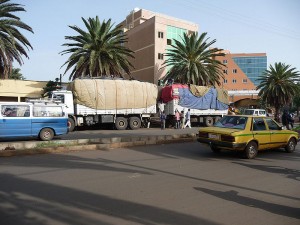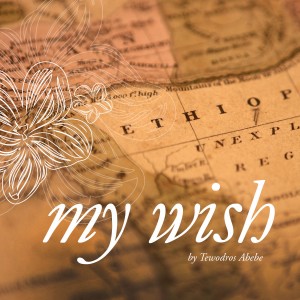Kansas Teacher Says Trip to Ethiopia Was Enriching, Adv10,

STERLING, Kan. (AP) Sitting atop a specially placed goatskin inside the village leader’s small mud hut, Amy Brownlee couldn’t help but feel humbled by the experience.
Brownlee and the group of Americans were the honored guests at a meal in a village near Bahir Dar, a city in northern Ethiopia. The locals fed them Injera, a pancake-size bread native to the country. Their hospitality and generosity were overwhelming.
“I’m sitting there thinking I’m probably eating their dinner,” she said. “I was just really impressed. Many of these people don’t have anything, but they were so warm and welcoming.”
Brownlee, a librarian and sixth-grade reading teacher for Sterling Schools, was one of 12 teachers from the United States who participated in a monthlong trip across the African nation of Ethiopia this summer. The trip, funded by a Fulbright-Hays Group Study Abroad Grant, was sponsored by Kansas State University and the non-profit Ethiopia Reads.
From her trip, Brownlee brought back Ethiopian recipes, native clothing and artifacts that she’ll use to teach her students about the country. But packed alongside those souvenirs, Brownlee says she brought home a deep appreciation of diversity and an intense awareness of her own culture.
Getting to the village that day was no easy task.
Transportation, like the most of the country’s infrastructure, is poorly lacking. When someone gets sick, they usually die before completing the long walk to the hospital.
An hour-long mule ride was the quickest route to their destination.
Nearly all the villagers had come that day to show off a rural water project, where the community had built a spout for clean drinking water, a place to shower, water for cattle and water to wash clothes. The people were joyously proud of having attained what seemed like basic needs.
“It really makes you thankful for what you have and critical of yourself for all the things you take for granted in life,” Brownlee said.
Seeing mothers and children with nearly nothing made Brownlee think about her husband and three small children back home in Sterling.
“We’re such consumers of things,” she said. “And we have so many things that we don’t need. I think, ‘What would I do if I was one of these mothers?'”
Brownlee loves her job teaching in Sterling. But she said the town of about 2,500 doesn’t offer much ethnic or religious diversity.
“She teaches in a part of Kansas that doesn’t have much diversity in it, so students often grow up without having a sense of how children around the world are different than they are,” said Jackie Spears, a professor of education at Kansas State University and director of the trip to Ethiopia.
The trip schooled the teachers on the ins and outs of Ethiopian culture. But Spears said the larger point of the trip was for the instructors to better understand, and better teach, cultural diversity.
“Until you actually go into another culture and see daily life through the eyes of those people, it’s a little difficult to understand diversity,” she said.
And, Spears said, Ethiopia is a perfect case study of the richness of cultural diversity.
She said Americans, with several predominant ethnic and religious groups, tend to think of themselves as very diverse.
But in Ethiopia at least 80 tribal cultures and languages exist alongside the three primary faiths of Judaism, Islam and Orthodox Christianity.
“And we think we have challenges here in the United States,” Spears said.
Brownlee and Spears both pointed out the defiant optimism of the Ethiopian people. Sub-Saharan Africa is listed as the poorest region on Earth. And Ethiopia counts as the world’s second-poorest nation, according to the Multidimensional Poverty Index, which ranks nations using the factors of length of life, knowledge and standard of living.
Still, Ethiopia’s inhabitants continue to work to improve infrastructure, the economy and quality of life.
“I saw a lot of really positive things and I certainly came away with a great deal of respect for people who have so little but seem undaunted by the challenges and continue to move forward to build an economy,” Spears said.
A classroom in Ethiopia might have more than 80 students. Five kids may share one textbook. But that doesn’t mean education goes unnoticed.
“There seems to be a very strong movement to educate children and get them in school,” Spears said.
Lawrence children’s author Jane Kurtz grew up in Ethiopia while her parents were working for the Presbyterian Church. She attended a portion of this summer’s trip to volunteer in what she considers her homeland. Though education in the United States is not ideal, Kurtz said many people take its quality for granted.
“I think that because we have a pretty successful education system, it’s hard to remember that education is seen around the world as a really precious treasure that people want to have,” Kurtz said.
Kurtz’s love for Ethiopia has transformed into a mission of providing libraries to a country that barely has books. She is one of the founders of Ethiopia Reads, which helps build and stock libraries in Ethiopian schools. The organization prints books in English and local languages and also collects new or used books nationwide that are sent to Hesston to be shipped overseas.
“We’re hoping to plant the idea of what a library is, and just how special a library can be,” Kurtz said.
She said many schools don’t have libraries. And many schools don’t have books other than texts. Still, children and adults are looking for ways to read. She said many people will sit outside at night under the streetlights to read, because many homes have no electricity. In schools that have libraries, patrons sometimes wait for up to an hour to get in because the place is so packed, Kurtz said.
“In Ethiopia people are hungry for books,” she said.
The teachers’ trip included visits to libraries created by the organization. Brownlee said she was moved when witnessing how the children in those schools treasured the few books they have.
“In my house, my kids have hundreds of books and they like to read,” she said. “But it is not a precious and amazing thing like it is in Ethiopia.”
Brownlee says her humbling trip to the third world will help her impart the importance of diversity and cultural awareness on her students and other Sterling teachers.
“I think just exposing ourselves to the outer world and learning about people who look and act differently from us is an important lesson,” she said. “Not to say one group is better than the other, but we need to bring attention to our own diversity.”


Average Rating